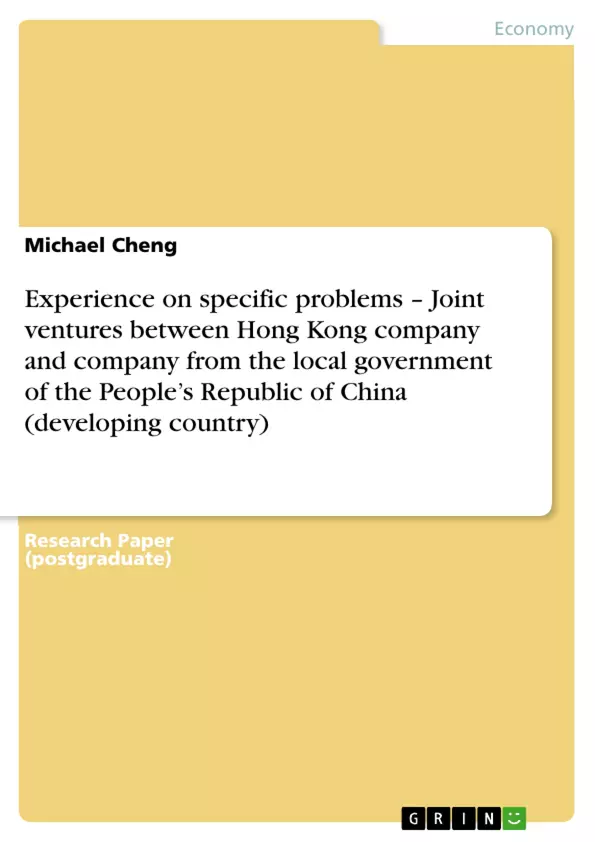Since 1978, Deng Xiaoping succeeded to launch his economic reform program “Open Door” policy that encouraged foreign investments. It was the beginning of a new era for China. Deng’s idea was to open China to foreign investments in order to acquire resources, such as technology, expertise knowledge, etc... Deng promoted a socialist market economy with Chinese characteristics. It means that a market economy with decentralized public investment and a socialist framework of the society. However, he changed the political system as well, decentralized economic decision-making, and began legal and bureaucratic reforms. Chinese economy has experienced significant growth. There is no doubt that this economics expansion has been a direct result of Deng Xiaopeng’s “open door” policy. Foreign investments have rapidly increased and more factories were established by offering tax privileges, such as reduced import tariffs or tax exemptions for certain imports amongst others. In fact, among the developing countries, China is currently the one that attracts the most foreign investments. Joining the World Trade Organization (WTO) in 2001, China pushed this development even further.
Inhaltsverzeichnis (Table of Contents)
- INTRODUCTION
- AIM/OBJECTIVE
- REASONS OF THE INTERNATIONALIZATION
- ENTRY MODE TO CHINESE MARKET
- SPECIFIC PROBLEMS
- Political Environment
- Protection Of Business Property Rights
- Economic Factors
- Technology Transfer
- Cultural Factors
- CONCLUSION
- RECOMMENDATIONS
- BIBLIOGRAPHY
- EXHIBIT
Zielsetzung und Themenschwerpunkte (Objectives and Key Themes)
This research paper aims to outline the reasons why companies choose to go international, focusing on the specific case of a joint venture between a Hong Kong company and a local government company in China. The paper investigates the challenges and opportunities involved in entering the Chinese market, particularly concerning political, economic, and cultural factors.
- Motivations for internationalization, particularly the need to stay competitive and respond to foreign competitors.
- The challenges of navigating the Chinese business environment, including political stability, property rights, and cultural differences.
- The specific issues faced by joint ventures in China, focusing on potential pitfalls and recommendations for successful ventures.
- The role of foreign investment in China's economic growth and the opportunities for companies to expand into the Chinese market.
- The importance of understanding cultural factors in international business, particularly in the context of China.
Zusammenfassung der Kapitel (Chapter Summaries)
- INTRODUCTION: This chapter sets the context for the research by introducing the significance of China's economic reforms and the growing importance of foreign investment in the country. It also introduces the specific case study of Defond Electric Industries Limited, a Hong Kong company, and its joint venture with a local government company in China.
- AIM/OBJECTIVE: This chapter outlines the research objectives, which include examining the reasons for internationalization, the challenges of entering the Chinese market, and the specific problems and recommendations related to joint ventures in China.
- REASONS OF THE INTERNATIONALIZATION: This chapter explores the various reasons why companies choose to go international, such as the need to remain competitive, respond to foreign competitors, and take advantage of cost-effective production opportunities in emerging markets. It provides examples of companies like Honda, Michelin, and Nike that have successfully internationalized their businesses.
- ENTRY MODE TO CHINESE MARKET: This chapter discusses different entry modes for foreign companies entering the Chinese market, with a particular focus on joint ventures. It highlights the increasing popularity of joint ventures as a result of government pressure and the advantages they offer in terms of access to local expertise and resources.
- SPECIFIC PROBLEMS: This chapter examines the specific problems that companies may face when entering the Chinese market. It covers political factors like the stability of the political environment, legal issues related to the protection of business property rights, economic factors such as technology transfer and labor costs, and cultural factors that can impact business practices.
Schlüsselwörter (Keywords)
Key themes and concepts explored in this research paper include internationalization, joint ventures, China's economic development, foreign investment, political environment, business property rights, technology transfer, cultural factors, and the challenges and opportunities faced by companies operating in the Chinese market.
Frequently Asked Questions
What was the impact of Deng Xiaoping's "Open Door" policy?
Launched in 1978, the policy encouraged foreign investment to acquire technology and expertise, leading to significant economic growth and a transition toward a socialist market economy.
Why do Hong Kong companies choose joint ventures with local Chinese government entities?
Joint ventures are often chosen due to government pressure and the advantages of accessing local expertise, resources, and established bureaucratic networks.
What are the main challenges for foreign companies entering the Chinese market?
Key problems include navigating a complex political environment, ensuring protection of business property rights, managing technology transfer, and understanding cultural factors.
How did WTO membership change the investment landscape in China?
Joining the World Trade Organization in 2001 accelerated China's economic development and pushed foreign investment levels even further by integrating it more deeply into global trade.
What role do cultural factors play in these international joint ventures?
Cultural understanding is critical for success, as it impacts business practices, communication, and long-term cooperation between international partners and local Chinese entities.
- Arbeit zitieren
- Michael Cheng (Autor:in), 2007, Experience on specific problems – Joint ventures between Hong Kong company and company from the local government of the People’s Republic of China (developing country), München, GRIN Verlag, https://www.grin.com/document/86192



